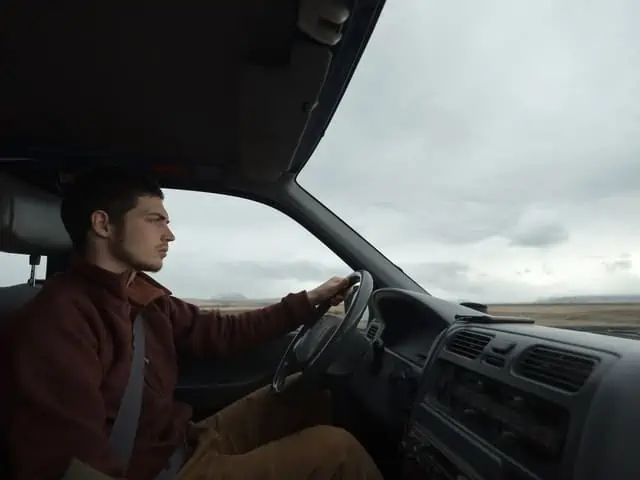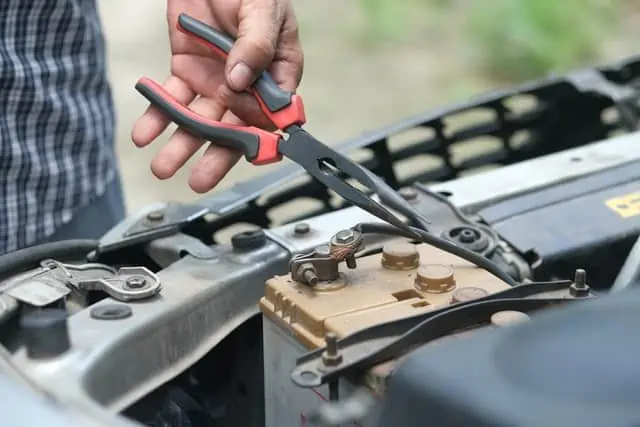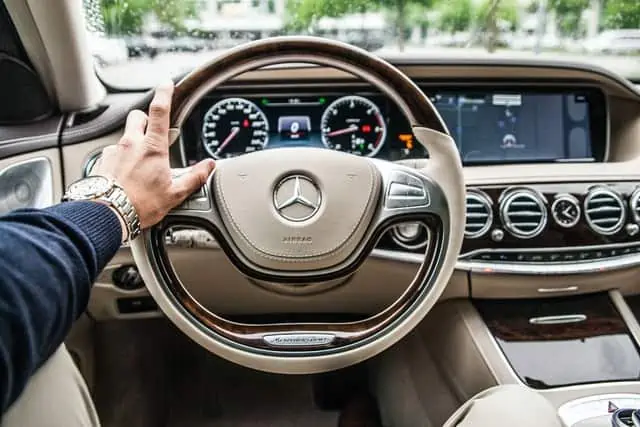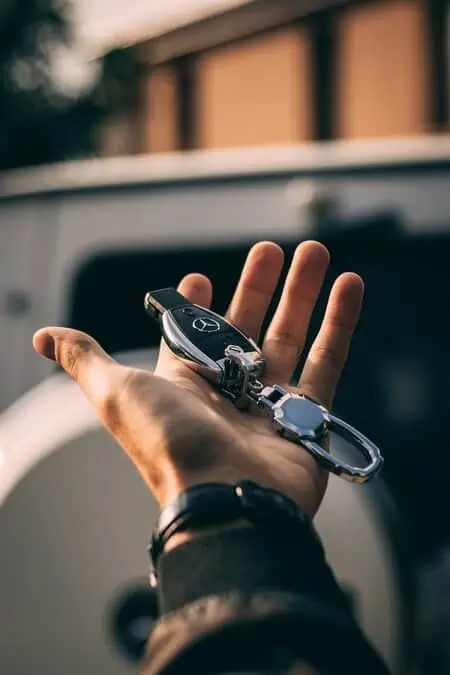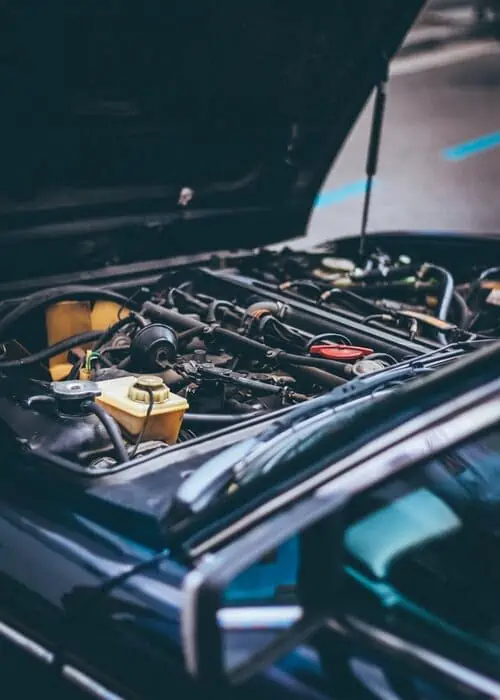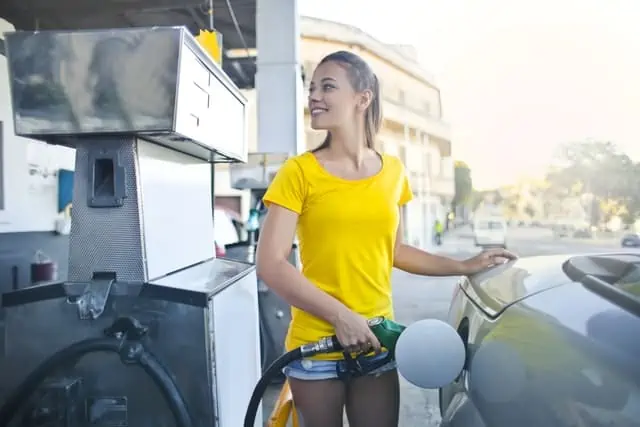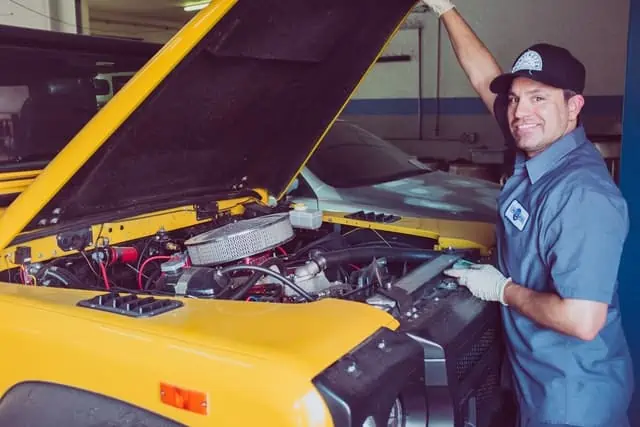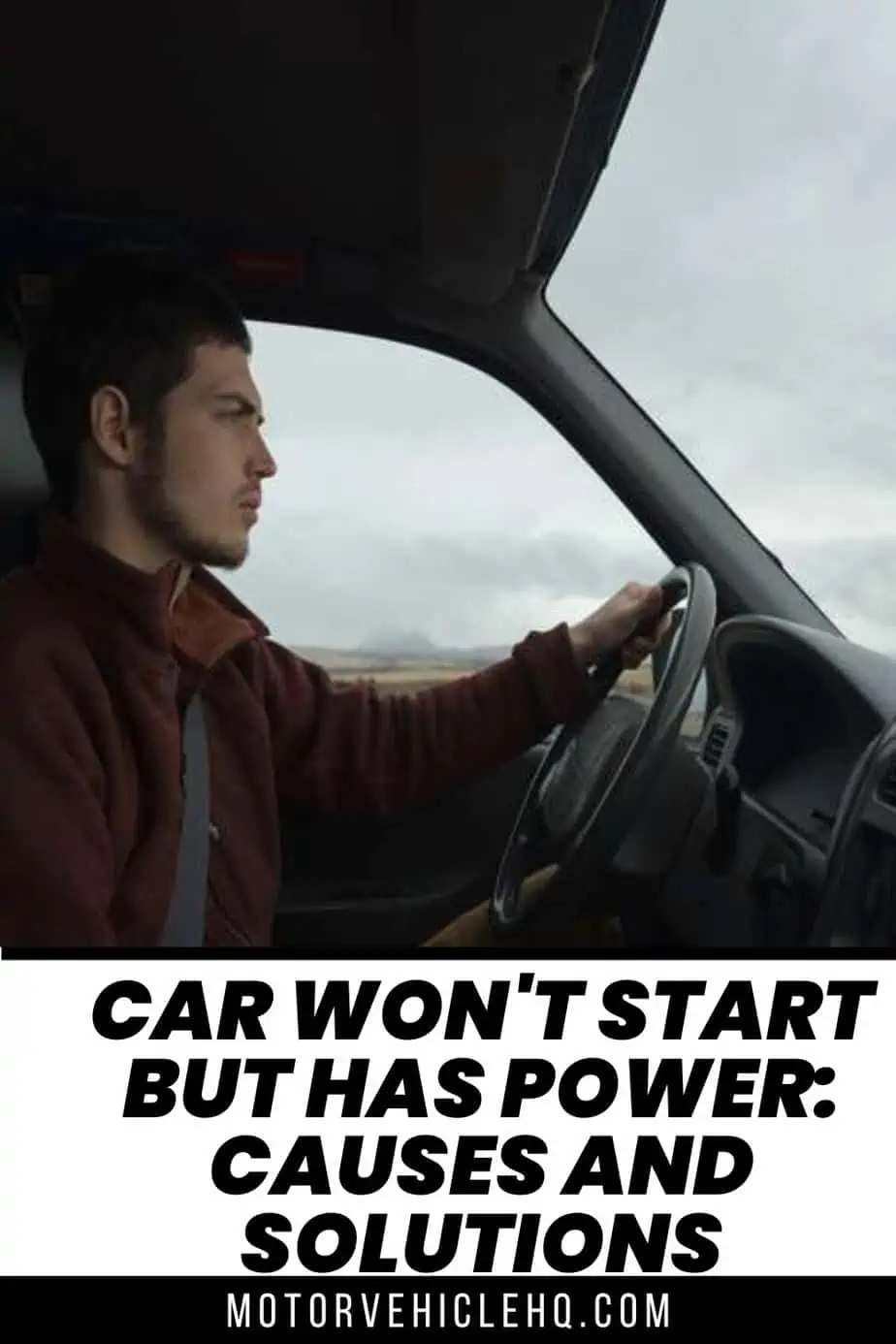If your car won’t start but has power, a few things might be causing the problem. In many cases, it can be a dead battery or a bad alternator, but you should avoid overlooking other culprits that might be causing the problem.
This guide will look at why your car won’t start or turn over even when it has power and how to fix it. If you’re not handy with cars, it’s advisable to contact a mechanic instead of trying to fix it yourself.
There are different reasons why your car isn’t starting when it has power. It’s important to identify the cause and fix it immediately.
Reasons Why Your Car Won’t Start When It Has Power and How to Fix It
Even if you maintain your car regularly, there are still different reasons it won’t start when it has power. Let’s take a look at the common culprits.
Dead Battery
It’s highly likely that your car won’t start because of the battery, so check this first.
An essential electrical component of your car is the battery, and it stores the power needed to run the vehicle. If your car won’t start because of the battery, it might be dead or weak.. Keep in mind that the car might start with a dead battery as long as there’s power in the alternator.
If you have a dead battery, you won’t hear your engine turning over during the crank. Also, the dashboard lights, dome lights, headlights, or instrument panel won’t turn on. Some cars will also indicate that the battery is dead.
Solution
The best thing to do is jump-start your car with a jumper cable, as this will help you charge your weak battery. You can also contact a mechanic to replace your battery if the power level is too low.
Faulty Battery Connection
If the cable connections on your car are damaged, loose, or ripped, your car won’t start. The cable won’t let the car start even if the battery has power. The connections might also be corroded along with your battery.
Solution
You can check if the cable connections are loose by twisting and turning the cables at the battery. If they are moving, you should focus on making them tight.
But, if they are dirty or corroded, you should clean the battery terminals and replace the cables. It’s advisable to contact a professional to do this for safety purposes.
Faulty Alternator
The alternator is a generator that recharges the battery and distributes electricity to the car. If your car won’t start but has power and the battery is fine, your alternator might have a problem.
You can tell that there’s something wrong with your alternator when electrical components in the car flicker, you smell something burning, the check engine light comes on, or your stereo system output has issues.
Solution
If you suspect something wrong with your alternator, you should contact a mechanic immediately for a replacement. A bad alternator can lead to a bad battery, which means more fixing costs.
Bad Fuse
A fuse in your vehicle is a component that protects the electrical wiring in your car. If it is faulty, your car won’t start, even if you have power. A damaged fuse will stop the power from reaching the starter relay, which is meant to provide the ignition to make your car move.
Solution
Read through your car manual to figure out how to locate the fuse box. Then, you can examine it for visible wire damage or check if you have blown a fuse. If you notice this, you can call a mechanic to come over or tow your car to the repair shop to get it fixed.
Ignition Switch Problems
If your dashboard or instrument panel is not coming on or the lights flicker, there is a problem with the ignition switch.
Sometimes, your car won’t start because of ignition switch problems. The ignition switch is in charge of moving power from the battery to the car components. There is no power in the ignition system with a bad switch to start the car.
This isn’t a common problem, but you should still look for symptoms. Your car key can get stuck in the ignition, and the dashboard or instrument panel will flicker or not light up. You will also notice no noise from the starter motor, or your ignition switch is constantly in the ON position.
Solution
If you’re sure that your ignition switch is bad, you can contact the mechanic to look at it. After you get this fixed, you should avoid putting too many keys on your car’s keychain, as this can put a strain on the switch.
Faulty Starter Motor
Your car’s starter motor is a device that rotates the internal combustion engine to start the engine under its power. If the starter motor is broken, your car won’t start when it has power. You might notice this with a grinding or whirring noise as you start your car or an extremely slow crank.
Solution
If you notice the signs of a faulty starter motor, you should get it replaced by a mechanic immediately.
Car is in Gear
Although this seems obvious, your car might not be starting even when it has power because of the gear. If your vehicle is in gear, it won’t start. Instead, it has to be in neutral or park.
If your car starts and you notice it is in drive gear, this is a sign that you have a faulty neutral safety switch, which is dangerous. It would be best to get that fixed immediately.
Solution
Move your vehicle to neutral and try to start it. You can also push the brake pedal or the clutch pedal using a car with manual transmission.
Key Fob Battery is Dead
A dead key fob battery is something that you might not suspect, but can actually stop your car from coming on even when it has power.
Sometimes, your car won’t start because of a dead-key fob battery. If your vehicle has a push-start system, and the crank fails when you press start, this might be because of a dead key fob.
Solution
Purchase a new battery for your key fob. You can open a key fob with a coin or small screwdriver and notice a small battery in a button or coin shape. Check the battery for particular numbers, as you need to purchase a new one with the same numbers.
If you’re having trouble opening your key fob, you can follow the instructions in the video below.
Bad Spark Plug
If you have a bad spark plug, this can also stop your car from starting when it has power. A bad spark plug prevents fuel ignition. Some signs include acceleration issues, rough idling, and engine misfires. You might also notice that your fuel levels go low quicker than normal.
Keep in mind that the distributor rotor or cap might be broken, and if this is the problem, the spark won’t travel. But, it is usually difficult to spot a bad spark plug because the sign comes with other issues in your car.
Solution
It’s essential to contact a mechanic to assess your car and determine if the spark plug is damaged.
Broken Timing Belt
The timing belt is a rubber strip that rotates the crankshaft and cap at the right time, and if it fails, your car won’t start. You might notice a ticking sound under the hood or even hear the starter motor engage, but it won’t turn on.
This issue is not common, but your engine can even get damaged if this is the case. Some vehicles feature a timing chain instead of a belt.
Solution
The solution to a broken timing belt is to hire a mechanic to replace it, as it cannot be fixed.
Problem with the Ground Cable Wiring
Sometimes, the ground cable wiring of your car might be damaged, which will stop it from starting. Pretty much all electrical components in your vehicle go through the cable, and if it gets damaged, it prevents the power flow in your car.
Some signs include faulty dome light, sensor issues, electric components fluctuating, a slipping clutch, bad fuel pump, and hard starting.
Solution
Open the hood of your car and check the ground cable. If it appears worn out, you should contact a mechanic to replace it.
Car Won’t Turn Over: What to Do
A damaged engine is one reason why our car won’t turn over. You should consider replacing the entire engine. But first, consider the starter motor and neutral sensor.
If your car won’t turn over but has power, some causes and solutions are here.
Faulty Starter Motor
If your starter motor is bad, you might hear a clicking sound when starting your car, or you won’t hear anything. But the engine won’t crank.
Solution
You will have to replace the starter if it is damaged. You can also push-start your car with a manual transmission, but this is a temporary solution.
Poor Transmission Range
There is a range selector in the automatic transmission shifter, also known as the neutral safety switch. When there is poor contact, the engine cannot detect whether the gear is in park or neutral. While this can stop your engine from turning over, it is also a dangerous problem leading to an accident.
Solution
In many cases, you can fix this problem with a few steps.
- Push the brake.
- Shift the gear to neutral.
- Start the engine.
If this doesn’t work, shift the gear to the park instead. If none of these work, you should replace the transmission range selector circuit as soon as possible.
Defective Starter Solenoid
The solenoid is a component on the starter motor that can stop your car from turning over even when you have power. The solenoid is located on the starter in modern vehicles, and if it is defective, you won’t even hear the engine clicking.
Solution
You can bypass the starter motor solenoid with an insulated screwdriver. Start by putting the metal blade between the ignition switch and the starter motor. But to avoid damaging your car, a mechanic can solve this problem for you.
Bad Wiring
Different wires connect the ignition switch to the starter, which can stop the car from starting when it has power. Your vehicle might also be stalling because of defective wiring.
Solution
This is a troublesome problem to deal with, and if you’re not sure how to identify a bad wire, you should contact your mechanic.
Seized Engine
If your engine seizes, there’s no chance of it turning over. An engine can seize because of wear and tear, exposure to water, low engine oil, or overheating.
Solution
If this is the issue with your car, it’s best to purchase a new engine. Although you can rebuild the engine, this expense isn’t worth it for an old car.
The Engine Cranks, but the Car Won’t Start
If your engine cranks but the car won’t start, there’s a good chance that the problem is fuel-related.
If your car won’t start but the engine cranks, this is a sign that there is nothing wrong with your electrical system. But, you need to create a balance of spark, fuel, air, and compression for the car to start. The most common problem in this situation is fuel-related.
Empty Gas Tank
For one, your gas tank might be empty. This seems obvious, but it’s still something you can miss. Also, if your fuel gauge is miscalibrated, you might run out of gas without knowing. Your fuel line might also become frozen if the weather is freezing, and the car won’t start until it is thawed.
Fuel Filter Requires Replacement
A clogged fuel filter can also stop fuel from reaching the engine, so you should check this and consider replacing it. This problem is most likely if you usually drive your car until the gauge shows empty.
Specific Symptoms to Look Out for and What to Do
Here are some other problems to look out for if your car won’t start when it has power.
The Car Engine Starts but Dies Quickly
If your engine starts but dies almost immediately, this can also be related to your car not starting when it has power. You can check the carburetor if your car has one and see if the choke opens and closes at the right time. But, it’s advisable to ask a mechanic for help.
Your Car Doesn’t Start on Rainy Days
If your car doesn’t start in certain conditions, like when it rains, this might be because moisture has affected the internal components. You can take the vehicle to a mechanic to check the distributor cap and stop water from penetrating the car. You can also cause the water to evaporate by using aerosol to remove moisture.
Your Car Makes a Clicking Noise When You Start It
Sometimes, your car makes a clicking noise but won’t start. This might be because of battery issues or improper battery installation. You can ask the mechanic to check your battery, especially if you recently replaced it.
Contact a Mechanic
When a car won’t start but has power, your best chances are with a reliable mechanic.
If your car won’t start but has power, it’s a good idea to contact a mechanic and fix the problem. This is mainly for those who aren’t handy with tools. The mechanic costs will differ based on the issue.
For instance, you can spend up to $3,000 on fixing problems related to the engine but only about $400 on repairing your starter motor. Regardless, don’t force your car to start as this can damage the other parts.
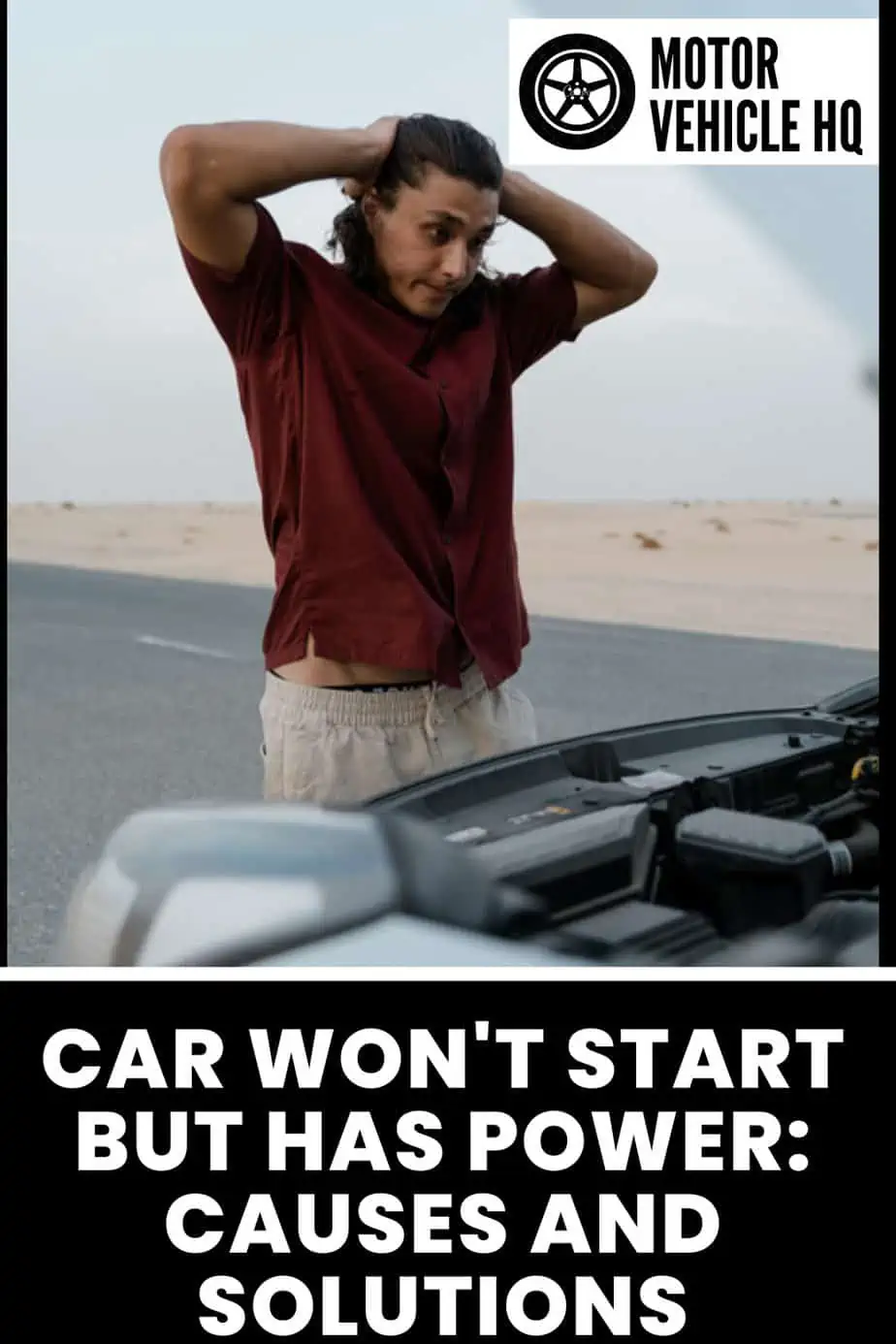

Jim Wicks is the founder of MotorVehicleHQ. With over two decades of experience in the automotive industry and a degree in Automotive Technology, Jim is a certified car expert who has worked in various roles ranging from a mechanic, car dealership manager, to a racing car driver. He has owned more than 20 cars over the past 15 years. Ask him about any vehicle you see on the road and he can tell you the make, model and year. He loves the aesthetics of all things cars, and keeps his vehicles in pristine condition.
In his free time, Jim enjoys getting his hands dirty under the hood of a classic car or taking long drives along the country roads. His favorite car? A 1967 Shelby GT500, a true classic that, according to Jim, “represents the pure essence of American muscle.”
